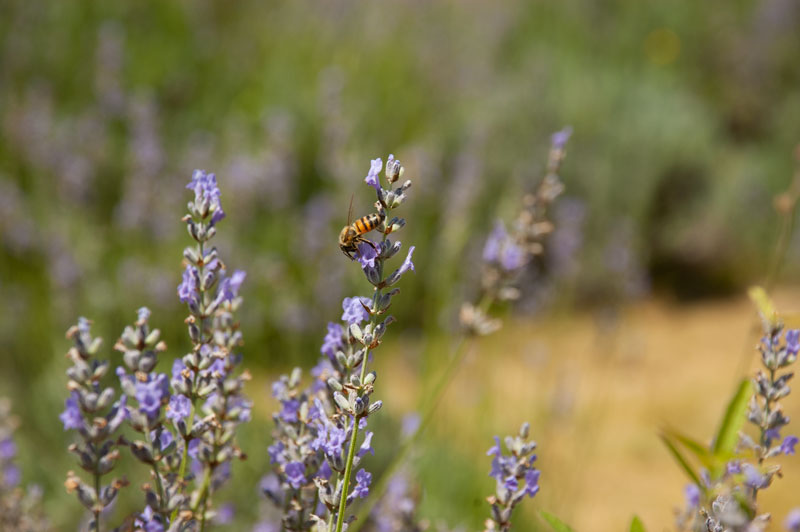
Lavender repels unwanted insects while attracting important pollinators, including bees. It’s the perfect plant to put in pots on your patio. Staff photo
Bug spray is not everyone’s favorite fragrance. Scented plants in containers, however, are rather pleasing. The advantage of planting some of your garden in pots is that you can move them to the porch or backyard.
Plant herbs and flowers that attract pollinators that EAT mosquitoes as well as plants that repel the blood suckers. (Did you know that dragonflies are often referred to as "mosquito hawks?") Many birds also feed on mosquitoes and flies also.
[image id="23316" title="Luedecke" linkto="file" ] Bill Luedecke and daughter Martelle offer advice to Highland Lakes gardeners.Citronella is well-known as a mosquito repellent, but there are plants that can do the job. Basil shoos away flies and mosquitoes. Lavender keeps moths, fleas, flies, and mosquitoes at bay. Lemongrass, lemon thyme, mint, and rosemary also repels mosquitoes. And, oh, the delicious smells growing.
Birds that you want as your neighbors because they eat bugs include: purple martins, bluebirds, chickadees, nighthawks, (according to Rodale organic life: “They aren’t hawks, but they are insect-eating superheroes that swoop over cities, fields, woodlands, and deserts, sucking up flying ants, flies, leaf chafers, mosquitoes, moths, and grasshoppers. Nighthawks even eat Colorado potato beetles, cucumber beetles, and squash bugs!”), nuthatches, phoebes, sparrows, swallows, vireos (Bell’s vireo), woodpeckers, wrens, scissor-tailed flycatchers, and summer tanagers.
Many more of our avian friends feed on pests. Keep water in your garden for the birds to help them wash down the bugs. Gentle reminder: Dump and refill the water every other day so you aren’t harvesting more mosquitoes.
AGARITA
Becky from Horseshoe Bay asks: “My agarita plant has brown leaves. It has been in the ground for a couple of years. Could it be getting too much water?”
You are correct Becky. The good news is that established agaritas are hardy, just not used to the abundance of rain that we have had.
According to the Lady Bird Johnson Wildflower Center: “If the roots of your plant have taken hold at all, the plant should recover if you prune off the dead branches, leaving only the green leaf-bearing stems. If in doubt, scrape the bark on a questionable branch. If green shows under the bark, the branch is still alive.”
LAWNS
To keep our lawns growing nicely during the summer, we want to promote deeper roots for our grasses. The way we do that is by cutting our lawns higher. The higher the grass blades are cut, the deeper the roots grow.
Cut Bermuda grass 1 inch, Buffalo grass 2½ inches, St. Augustine 3 inches, and Zoysia 1 inch.
The deeper the roots, the healthier the grass all summer. Keep in mind you never want to cut more than a third of the blade in one cutting — that will shock your lawn.
POISON IVY
Poison ivy (toxicodendron radicans) has flourished this year. It is always wonderful to discover how God provides a natural antidote. In this case, the antidote is the jewelweed plant (impatiens capensis). Guess where it grows? Right next to the poison ivy, in most cases. Rub the leaves of the jewelweed on the exposed area to neutralize the effects of poison ivy.
If you’re really allergic, jewelweed-infused healing balms, salves, and soaps can be found at your local pharmacy, grocery store, and online.
Till next time. Keep your souls and soles in your garden!
Remember the True Master Gardener: Jesus said, “I am the vine; my Father is the Gardener.” John 15:1
Call Bill Luedecke at The Luedecke Group Realtors at 512-577-1463 or email him at bill@texasland.net. Contact daughter Martelle Luedecke at 512-769-3179 or luedeckephotography@gmail.com.










